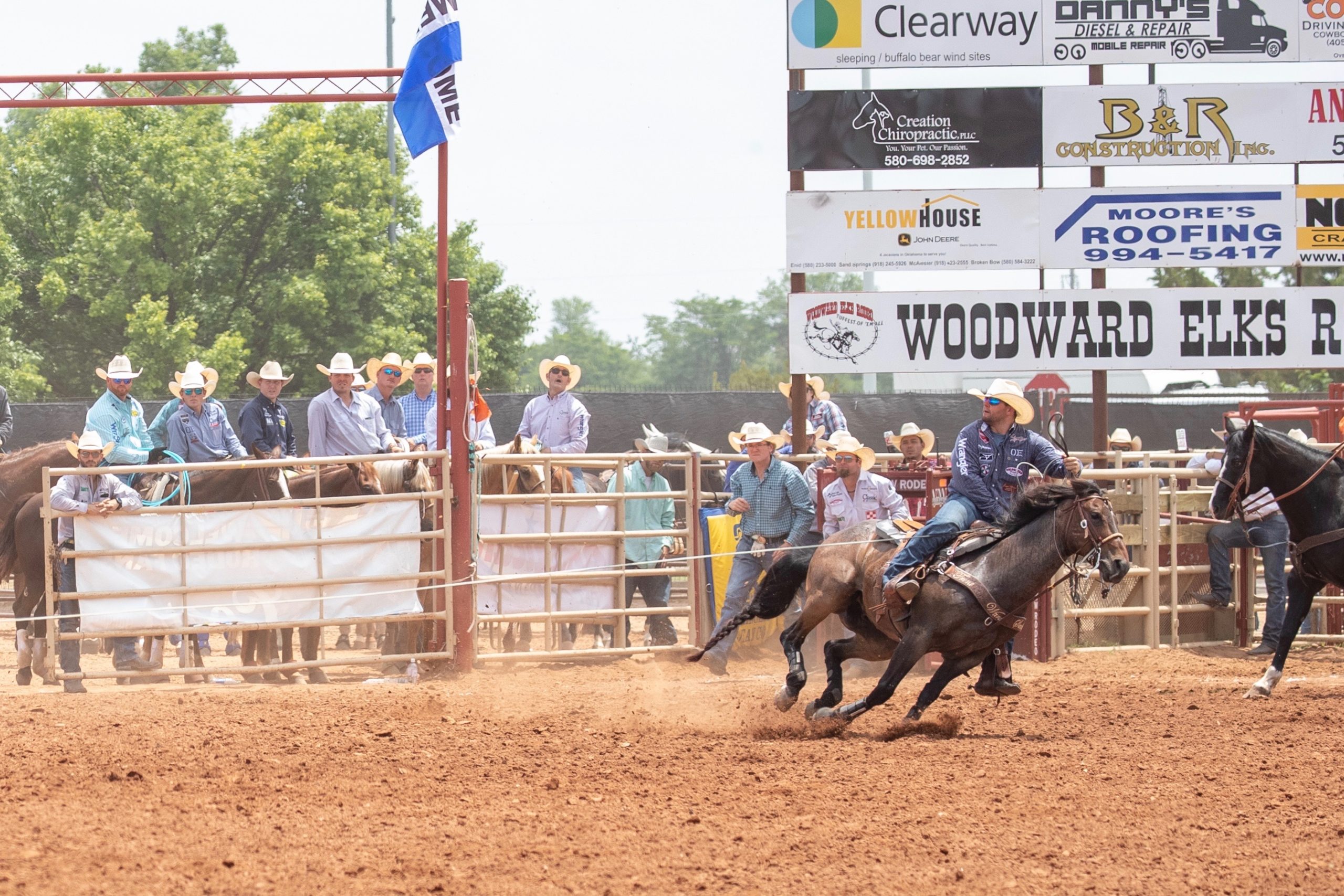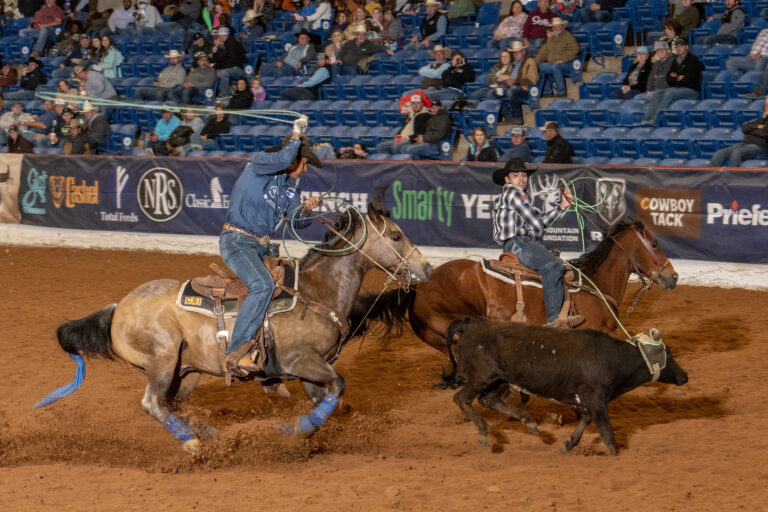Right now, for the first time in decades, good PRCA runs are getting more love … er, dollars. That’s thanks to a new ground rule in place at one-headers, some of which will pay up to 50% more places.
“Rodeos are so stinking tough and it’s so hard to make a living out here, we felt like if we paid more holes at bigger rodeos, it could get guys entering more rodeos and keep them going longer,” said NFR header Jake Cooper.
The deepest any PRCA event has ever paid was 10 places. The new ground rule in team roping is that a rodeo with a total purse of $12,500 to $20,000 will pay 10 holes; one with a purse of $20,000 to $30,000 will pay 12 places; and any one-header with a purse over $30,000 will pay 15 glorious places. That means Cody, Wyoming. That means San Juan Capistrano, California.
Several members have been working on this for years, said Cooper, and they were inspired by the WPRA. Barrel racers have been paying themselves 12 and 15 holes deep for decades.
“Barrel racing is dominated by a handful of contestants probably more than any other event, yet it’s one of the most-entered events in rodeo,” Cooper explained. “They know they have a lot of opportunities to win money even if they can’t beat the top five or six barrel horses.”
The new rule is what Buddy Hawkins calls “a win-win-win.” It should help contractors because guys will be easier on the steers; it should help cowboys by keeping them in the black and committees by boosting falling team counts; and it should help fans watch a better show.
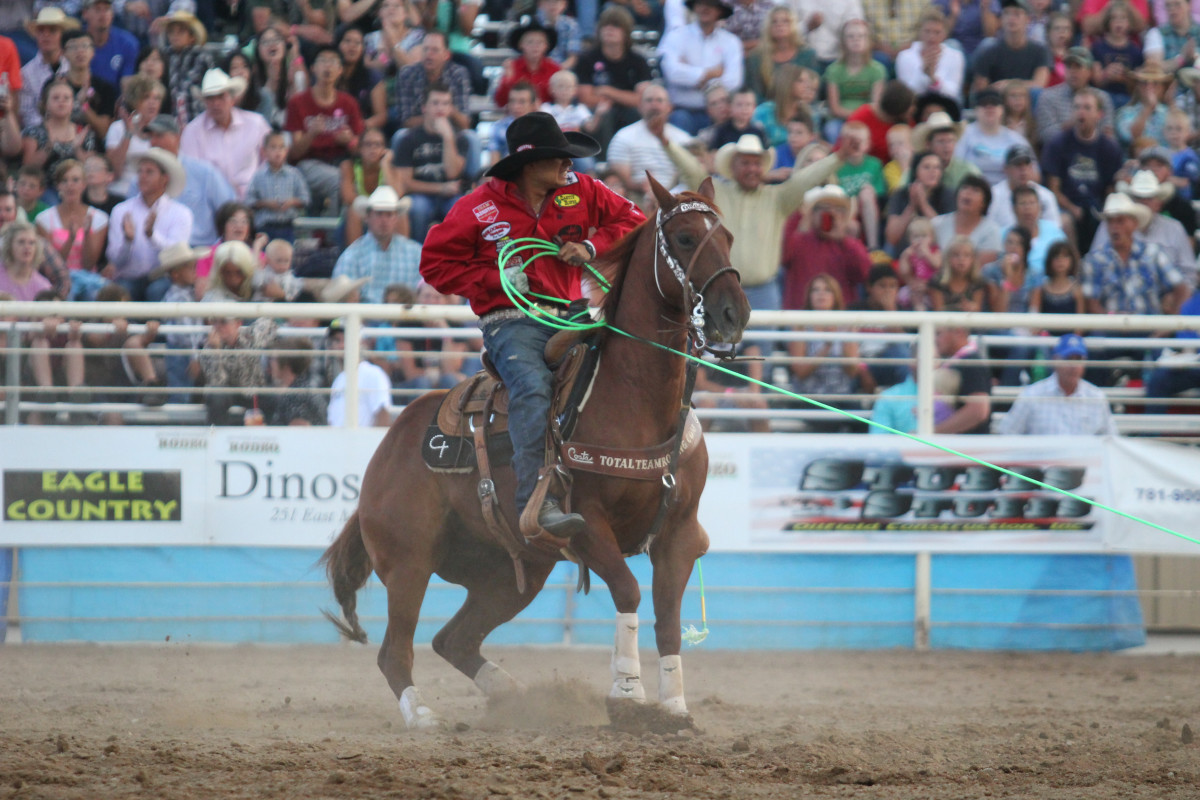
TRJ File Photo/Cowboy Images
Spreading the love
Consider Oakley, Utah, last year. A world-record-tying, 3.3-second run was needed to win the rodeo, while a 4.7 barely tied for 10th place—and paid $137. This summer, if Dustin Egusquiza and Travis Graves get on another Fourth-of-July heater and win there, it might only pay them $3,750 a man instead of $5,202. But the good news is that 10th place in 2022 will be worth more than $1,000 each. Hello, diesel money.
“A lot of guys go rodeo over the Fourth and they go to 10 rodeos and make two good runs and maybe one of them places and one doesn’t,” Hawkins explained. “They lose $10,000 and go home after the Fourth with no chance to make the Finals.”
But he feels like the biggest winners of the new payoff format are fans. They stand to see clean runs instead of no-times for chucking and ducking at a tiny pay window.
“Fans are what make the world go ’round,” Hawkins said. “At the end of a perf, when the announcer explains what we were supposed to do and none of us were able to do it in 4-flat, that’s a sad thing that fans didn’t get to see us at our best. Now they’ll see a lot more catches.”
Hawkins, too, notes that only about 10% of steers take guys to the pay window at any given rodeo. Too many teams end up drawing in that 90th percentile for a week or even a month at a time, he said. That hurts. Thus, gold-buckle switchender Matt Sherwood likes the rule he helped put in place as the team ropers’ Executive Council rep on the PRCA Board.
“Guys who don’t draw quite as good a steer now have a chance to win a couple thousand bucks for eighth or ninth,” he said. “We’ll try it for a year and see what the feedback is before we change the actual payoff formats.”
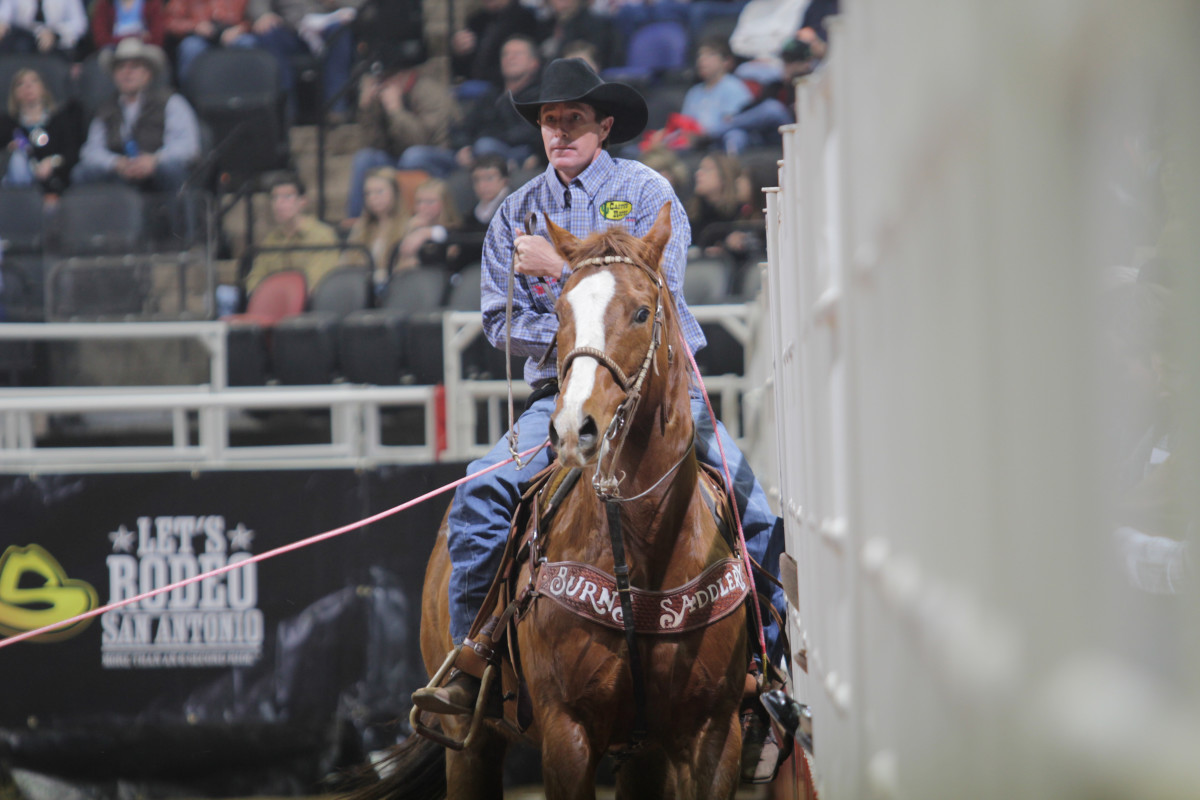
Profiting on good runs
At press time, only a couple of 2022 rodeos had implemented the new ground rule. At Rapid City, South Dakota, in February, 12th place paid a decent $566 a man—the same as ninth place paid there in 2019. That means, too, that the recent champs earned $3,961 each for their 4.2-second run, instead of the $5,273 it paid in ’19. Ironically, that rodeo was won by Cooper and his partner, Sid Sporer.
“The guys were joking with our new rule that I cost myself,” Cooper said. “But I’m not usually a win-first guy. And I’m fine with it costing me a little, because more guys down the line make extra, which keeps them entering and being able to go. Tenth used to be a terrible check that wouldn’t even cover your fees, much less your time and expenses getting to Rapid. This time, it paid $1,415 a man.”
It’s worth noting that maybe the hardy souls who braved South Dakota this winter weren’t aware of the new ground rule. Expecting the Black Hills Stock Show’s usual wicked-tough one-header, they missed a lot of steers. How many? The brand new 11th and 12th holes paid guys with leg penalties.
That perfectly illustrates what Sherwood says is the point of the rule—that teams will make more clean runs because not everybody has to go for the top couple of holes. He thinks that will help the rodeo committees. To that end, Cooper felt like team counts were up at Arcadia, Florida, in March because of the new rule. Last year, the champs of Arcadia had earned $4,949 a man while 10th paid $275. This spring, Shay Carroll and Evan Arnold won it with a 4.9 to earn only $3,158 each, but 10th paid $1,128 a man. Plus, two more teams got paid.
“Years and years ago, when the PRCA’s percentage payoff was set up, I just don’t think they ever imagined rodeos having such high entry fees and so much added money,” Sherwood offered.
Nor did they imagine $5-a-gallon diesel fuel. Perfect timing, then, for a 4.7-second run to actually be worth something this summer.
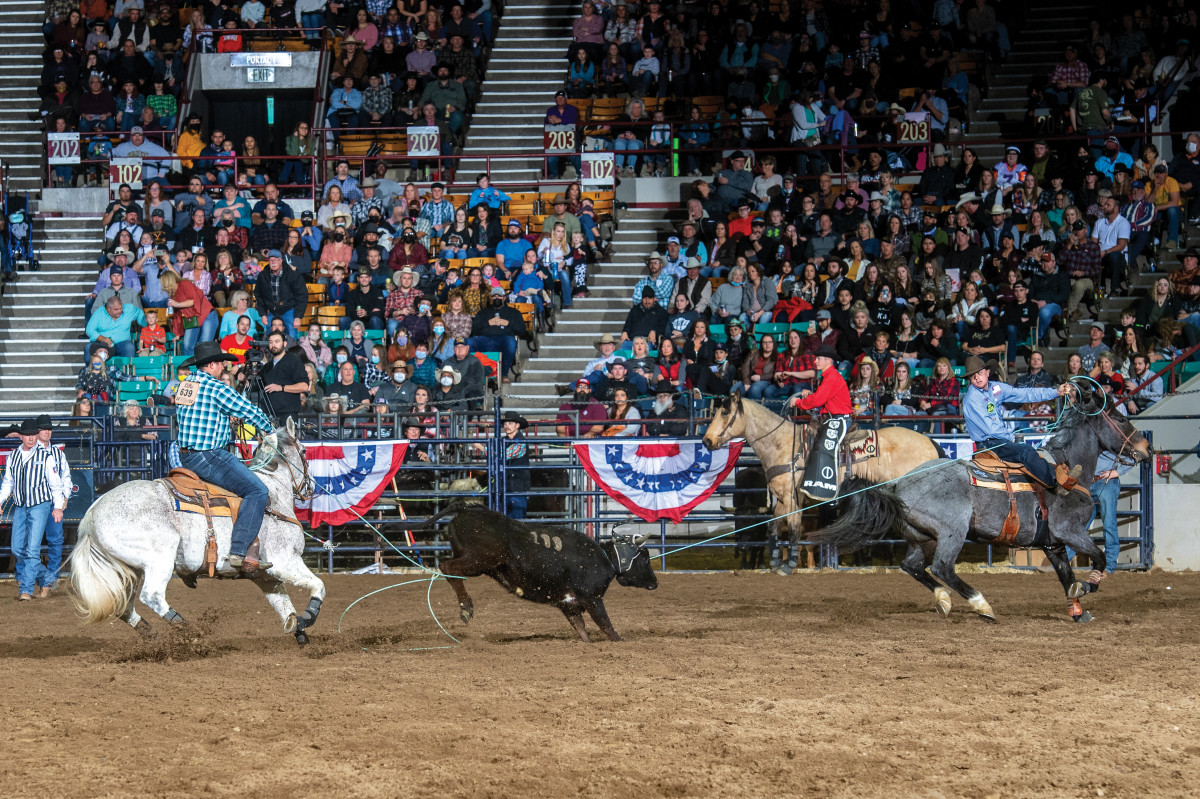
More runs, same money
Payoffs in professional rodeo have changed along with the trend toward sudden-death tournament formats.
Take Denver. In January at the National Western, Coy Rahlmann and Douglas Rich roped two steers fast enough to make their semi-finals. There, they placed second, then they won the finals to earn $7,292. The most possible money for team ropers, if they won all four rounds, was $15,466.
Back in 2018 when Denver was the traditional “two and a short,” the most possible money for a winning team was an almost identical $15,302—but you only had to rope three steers. Back then, Aaron Tsinigine and Kyle Lockett didn’t place in the first two rounds, either, but placed in the finals and won the average on three for a nearly equal $7,125.
Defending NFR average champion heeler and American Rodeo champ Buddy Hawkins has analyzed this.
“I think if a rodeo is tournament-style, it needs to pay money in each perf,” he said. “Austin and Denver this year were not full tournaments. We can go make a good run and beat everybody that night and not advance. We can make two trips there for free. That’s bad business for us. If I made two trips to Reno and made no money, surely somewhere I had a chance. That’s not the case at Denver and Austin. They either need to add $100,000 per event or go back to two and a short. It’s the same reason rodeos that only add $1,000 can’t have a short round.”
Committees lately prefer sudden-death formats because they think fans want to see a winner each night.
“Honestly, since every tournament rodeo has a slightly different format, we’ve made it more confusing for fans,” Hawkins pointed out. “My mom has no idea how these rodeos work, and I’ve been going to them for 12 years. I’m not opposed to a unique format, but we have to draw the line if we’re spending more money to make the same money as before. That does not work. Plus, can we try to protect these roughstock riders’ health and these timed-event guys’ horses by limiting rides and mileage, instead of adding more?”
He has friends who live in Denver and don’t watch the perfs because they know there’s no money in them. If it’s a true tournament with a winner every night, he said, then pay the winners every night like at the NFR. People will watch.
“I like tournament-style rodeos, but most don’t have enough added money to do it, Denver included,” said Matt Sherwood. “Guys have so much in travel that those first few perfs don’t pay enough to justify that format. For instance, every perf at Houston pays $3,000, so even if you don’t win the $50,000, you can justify entering.”
Comparatively, team ropers at a WCRA tournament-style rodeo may also make two trips—except top seeds, who earn a direct bye into the finals. At Rodeo Corpus Christi every May, for instance, each qualifying and progressive perf pays $2,100 a man to win. Plus, every team in the finals is guaranteed to earn at least $1,000. Also, no entry fees. The nomination fees for eligibility sometimes amount to roughly $100. Plus, a finals on CBS on Sunday afternoon is a little different form of payoff for cowboys via sponsors. Win, win, win. TRJ




